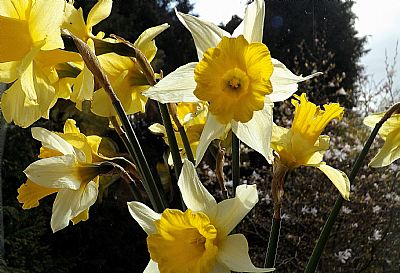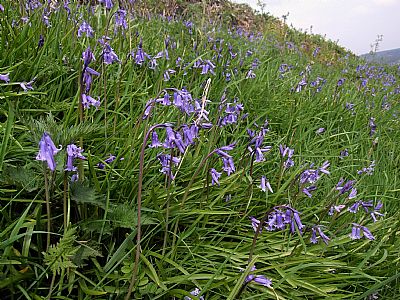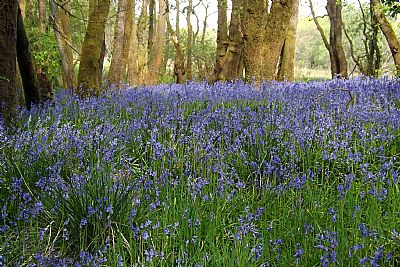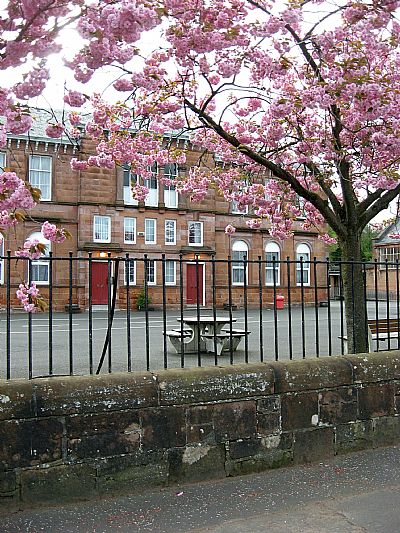SPRING
The first glimmer of spring arrives with snopdrops. We imagine the days getting longer and sunnier. But that is too soon. The real signs of spring are a variety of new buds, the most iconic of which is the bluebell, although daffodils create impressive shows too.
In late winter of 2024, heavy winds battered West Dunbartonshire and many trees came down. And in February 2025, the predicted high winds were so severe that warnings were sent out on everyone's smart phones. Such winter weather may not have been severely cold, but it seems to make us all the more optimistic that the smallest green shoot heralds the oncome of spring. The appearance of snowdrops is one signal. Daffodils are another. We get emotionally involved. And then get distressed if more dreich weather follows. So when does spring actually start?
The first day of spring in the UK astronomically occurs on the vernal equinox, 20 March 2024. But did you know there are actually three main definitions for the season coming from astronomy, meteorology and phenology?
For most of the northern hemisphere, the spring months are usually March, April and May, and so by this definition spring starts on 1 March. This is because meteorologists tend to divide seasons into periods of three whole months based on average monthly temperatures, with summer as the warmest and winter as the coldest. [Royal Museums Greenich].
The BBC tries to be helpful:
When does astronomical spring begin?
In 2025, it will be 20 March. This is the date of the spring equinox which is determined by the Earth's tilt as it travels around the Sun. On the equinox, the Sun crosses the equator, making day and night nearly equal in length. The word "equinox" comes from Latin, where equi means "equal" and nox means "night." Beyond the equinox, days will be longer than nights. Astronomically, spring ends on 21 June, at the summer solstice.
What about phenological spring?
You may also want to consider phenology - the behaviour of plants and animals in response to the changing weather and climate - as another marker for the start of spring. For those who follow nature, dates for the start of phenological spring are highly variable due to the weather conditions and species.
Frogspawn, for example, may appear in late February whereas bluebells sometimes appear in early April.
Confusingly, all this has little correlation to the clocks changing. See index.asp?pageid=734365
The Scots Language website talks mainly about the words and impacts well north of us, but we can vouch for the reference to high winds in late winter / early spring.
Here in West Dunbartonhshire we seem to stoically, yet grumbling see the mixed dreich weather through. With the onset of winter we brighten our lives with lights, parties and fireworks, but with the irritatingly hestitant onset of summer just seem to hold our breaths. There is usually a bright warm spell in March with whispers of summer in sight, but this is tempered by more cold, often windy spells before we can really claim to be in summer. Yet through all that spring is unfolding with some wonderous sights. New buds and first flower.
Should we be doing more to celebrate this rough time into the joys of summer? The Scotsman tells us of some of the traditions north of us. See the link below for some interesting features.

Renton daffodils. See index.asp?pageid=731753

A road bank above Renton.

The amazing scene in the RSPB Loch Lomond Bird Reserve. See index.asp?pageid=715851

Blossoms at Christie Park Primary School. See index.asp?pageid=715771
ROYAL MUSEUMS GREENWICH :https://www.rmg.co.uk/stories/topics/when-does-spring-start
SCOTS LANGUAGE website : https://www.scotslanguage.com/Weather_Blether_uid154/Spring#:~:text=The%20three%20months%20which%20make%20up%20this%20season,Easter%20which%20was%20grafted%20onto%20existing%20pagan%20tradition.

